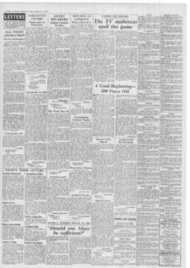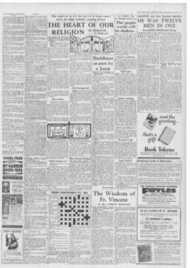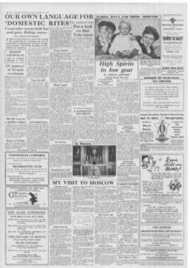Page 4, 11th December 1953
Page 4

Report an error
Noticed an error on this page?If you've noticed an error in this article please click here to report it.
Tags
Share
Related articles
A Vehicle For Ustinov
Theatre
Theatre
Theatre
A Fried Parson
No Oysters for Mr. Ustinov
THEATRE: By W. J. IGOE •
NO SIGN OF THE DOVE (Savoy)
MR. PETER USTINOV is not a. simple man, nor is he complex. He is half a simpleton bemused by contemporary problems to which he applies a chaos of undefined prejudices; he pours the consequent patchwork upon paper, calling it a play.
An idea is in his play, but it is not given dramatic shape. It is a good idea that dissolves in Oxford Street knowingness and a gluey mess of notions about the churches, art, philosophy, psychology and the Common Man.
G.K.C. once said that the trouble with Welfs's utopias was that no one ate buttered toast in them. In the world as Mr. Ustinov sees it there are only fools and rogues, threatened by atomic energy and devoid of oysters, stout, babies and folks who play the melodeon.
Like the late James Bridic, ideas sparkle from Mr. Ustinov like flashes from a good Roman candle; but unlike the intellectual flying missiles sparked by the good doctor, Mr. Ustinov's ideas twinkle and dissolve in darkness.
HISHIS material is the human race a rising flood. In the home of two writers given the charming names Sir Mohammed and Miss Niobe and the silly surname D'Urtone can almost hear Ustinov Minor giggle, "Smashing wheeze chaps"— the race is assembled.
Niobe and Mohammed are given a cartoonist's semblance of two famous aristocratic word gourmets of the day. Submerged in cultural bric-a-brac, roccoco souvenirs of trips to Paris, Vienna, Rome and environs, the Brightons and Atlantic Cities of the rich and uncommon men of the past 30 years, they cultivate gardens planted with the staler and more effete blossoms of continental art.
Niobe admires Mohammed, trilling like a failed classical actress giving readings from Gertrude Stein at Workers' Playtime; Mohammed admires himself, posturing like a shop-walker impersonating Mr. Noel Coward. He wears a dressing gown.
The D'Urts have guests. Lord Basingstoke finances a literary magazine entitled Midnight Oil and printed in white type on black paper; his wife is a cheerless nymph without morals and the urge to be immoral.
The third guest is Prof. Lodegger, a Central European who believes in Hate and has written a book about it.
Each of these five symbols, hosts and visitors, is stated early in the first act and is left undeveloped, giving the play the effect of a revue sketch played in funereally slow motion.
MOHAMMED tries to seduce Lady Basingstoke; so does the professor. Lord Basingstoke and Miss Niobe try to seduce each other.
Two detectives, a weak-minded oaf with kindly intentions, Mr. Ustinov's Common Man, and a Warren Street smoothie watch the assorted "lovers," trying to get grounds for separate divorces.
Mr. Ustinov, I suppose, might have written an amusing comedy about similar nitwits; he might have written a good play about the treason of the clerks.
Some such idea seems to have fluttered among the bats in his overpopulated belfry. But he must learn, if he is to avoid the legitimate booting of the owls in the gallery, that entertainment is more than bright notions released as such to the cash customers. The waters rose in the end and we were left in our snug seats with the words of the last chorus of "Three Blind Mice" tolling in our ears. Humanity. as we are supposed to know it, had been swamped standing to ragged attention on the roof of the stately home.
In the darkest hour, which heralded no dawn, a bewhiskered ancient who recalled Father Noah, Lear, Old Moore and was dressed like the mariner who decorates Skipper's sardines, had condemned humanity and the churches. The latter he treated very roughly because they are disunited; he gave no clue that M r. Ustinov knows what they should be united on and about. He sailed away to seek a new day, taking with him the noble savage, a. female waif, a girl. This pretty creature, in the adequate shape of Miss Suzanne Cloutier, being good, was inarticulate. At what I took to he a 'symbolical moment," she cried her single line, her word: "Boccacio."
Before his next first night, Mr. Ustinov, I suggest, should cry "Abracadabra." It might help. The experience, anyway, would be useful.
THE BOY FRIEND (Embassy)
CLOCHE hats, girls with dangling eyelashes and shapes like gate posts draped in pallid silk, young men with teeth, blazers and loitering limbs, twinkling tunes, "stuffed owl" lyrics. Mr. Sandy Wilson has written a pastiche of musical comedy as it was presented in the 'twenties, a satire with a good heart, that is, a comedy at its most delightful and touched by pathos.
This is perfect entertainment for adults (children will not appreciate its humours). I recommend it most strongly for Christmas parties and for the solitary theatre-goer too.
blog comments powered by Disqus









